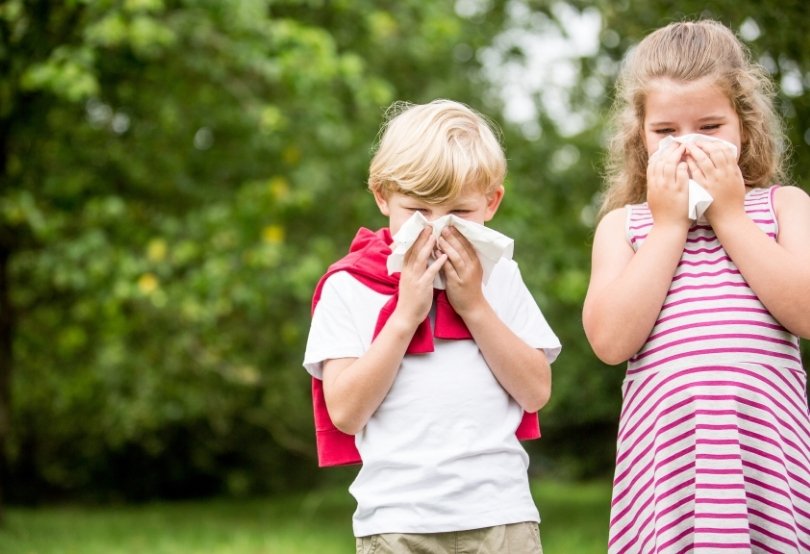
What is Allergy?
Allergy is an exaggerated immune response to substances that are typically harmless to most people. These substances, known as allergens, can include food, pollen, pet dander, mold, and certain chemicals. When an allergic person comes into contact with an allergen, their immune system mistakenly identifies it as a threat, leading to a variety of symptoms that range from mild to severe.
The immune system’s overreaction involves the production of antibodies called Immunoglobulin E (IgE). When these antibodies detect an allergen, they trigger the release of chemicals like histamine into the bloodstream. This response leads to inflammation and the various symptoms associated with allergies.
What are the Symptoms of Allergy?
The symptoms of an allergy depend on the type of allergen and how it interacts with the body. Some of the most common symptoms include:
1- Sneezing and Runny Nose
Allergic rhinitis, also known as hay fever, is a common manifestation of allergies. It often presents with sneezing, a runny or stuffy nose, and nasal congestion. These symptoms are particularly common with airborne allergens like pollen and dust mites.
2- Itchy and Watery Eyes
Eye-related symptoms, also called allergic conjunctivitis, can occur when allergens come into contact with the eyes. The eyes may become red, itchy, swollen, and excessively watery as a result.
3- Shortness of Breath and Wheezing
In more severe cases, exposure to allergens can affect the respiratory system. This can lead to shortness of breath, coughing, and wheezing. In individuals with asthma, allergic reactions can trigger asthma attacks, further complicating breathing difficulties.
4- Skin Redness and Swelling
Skin reactions are another common form of allergic response. Conditions like eczema, hives, and contact dermatitis can cause redness, swelling, and itching. These reactions typically occur when the skin comes into direct contact with allergens.
What are the Causes of Allergy?
The exact cause of allergies is not fully understood, but it is believed to be a combination of genetic and environmental factors. People with a family history of allergies are more likely to develop them. Common allergens include:
– Pollen: From trees, grasses, and weeds.
– Food: Such as peanuts, shellfish, and eggs.
– Dust mites: Microscopic organisms found in household dust.
– Animal dander: Proteins found in the skin, urine, and saliva of pets.
– Insect stings: Including bee or wasp venom.
– Medications: Penicillin and other antibiotics.
– Mold spores: From fungi growing in damp areas.
When is Allergy Most Common?
Allergies can occur at any time, but certain types of allergies are more prevalent during specific seasons. Seasonal allergic rhinitis (hay fever) is most common during the spring, summer, and fall due to increased pollen levels. In contrast, indoor allergies such as those triggered by dust mites, mold, and pet dander can occur year-round, though they may worsen during colder months when people spend more time indoors.
What is an Allergy Test?
An allergy test is a medical procedure used to determine whether your immune system reacts to specific allergens. It can help identify what substances are triggering your allergic reactions. There are two primary types of allergy tests:
Blood Test
Also known as a specific IgE test, this method measures the level of IgE antibodies in the blood that react to particular allergens. It is often used for individuals who cannot undergo skin testing due to skin conditions or other health concerns.
Skin Test
The skin prick test is the most common allergy test. A small amount of the suspected allergen is applied to the skin, usually on the forearm or back. The skin is then pricked to allow the allergen to penetrate. If the person is allergic, a small raised bump (hive) will appear at the site within 15-20 minutes.
How is Allergy Treatment Done?
Treatment for allergies typically involves a combination of lifestyle adjustments, medications, and possibly long-term therapies like immunotherapy. The goal is to reduce symptoms and improve quality of life.
Drug Therapy
This approach includes over-the-counter and prescription medications that help alleviate allergy symptoms. These can include antihistamines, decongestants, corticosteroids, and nasal sprays.
Vaccine Therapy (Immunotherapy)
Allergy shots, or subcutaneous immunotherapy, are a long-term treatment designed to reduce sensitivity to allergens over time. The patient is exposed to gradually increasing doses of the allergen, helping the immune system build tolerance. This treatment is often recommended for people with severe allergies or those who cannot avoid allergens.
Who Should Get Allergy Tests?
Allergy tests are recommended for individuals who experience persistent or severe allergic symptoms that cannot be easily identified through observation or lifestyle adjustments. It is particularly useful for people who:
– Experience frequent sneezing, coughing, or wheezing.
– Have chronic or recurrent sinus infections.
– Develop skin reactions like hives or eczema.
– Suspect that food or environmental factors may be triggering allergic responses.
– Suffer from asthma that worsens with allergen exposure.
What are Allergy Medications?
Allergy medications help manage symptoms and are available in various forms, including oral tablets, nasal sprays, and eye drops. Some of the most common allergy medications include:
Corticosteroids
These medications reduce inflammation and are available as pills, nasal sprays, and creams. They are highly effective in reducing the immune response and managing chronic allergy symptoms, especially in the nose, lungs, and skin.
Nasal Sprays
These sprays, including both corticosteroid and antihistamine sprays, are used to relieve nasal congestion, sneezing, and runny nose. They work directly at the site of irritation and are often used for seasonal or perennial allergic rhinitis.
Why Choose Us?
Our clinic specializes in allergies and allergy testing, and we stand out in the field of health tourism with the high standards of service we provide. Here are the key reasons why you should choose us:
Expert Doctor Team
At our clinic, we have highly experienced doctors at the professor level who are experts in the field of allergies. With years of experience in allergy treatment and testing, we provide the most accurate diagnosis and treatment processes. Our professor is skilled in managing even the most complex allergy cases and delivering the most effective solutions.
Cutting-Edge Allergy Tests
Your health is our top priority. In our clinic, we use state-of-the-art allergy testing technologies that are recognized globally. This allows us to obtain the most accurate and rapid results, ensuring that your treatment plans are created in the best possible way. Our tests are conducted according to international standards.
Comfort and Luxury Services
We don’t just focus on treatment; we also aim to provide a comfortable experience. During your treatment, we offer five-star hotel accommodations to ensure you feel at home throughout the process. Your comfort is guaranteed with the luxurious services we provide.
Transfer and Transportation Convenience
For patients coming from abroad or from other cities, we offer VIP transfer services. From the airport to our clinic, and from our clinic to your hotel, we are with you every step of the way. We take care of every detail to ensure your comfort and safety.
Personalized Approach
Every patient’s health condition is unique, and we tailor our solutions to meet each individual’s specific needs. Throughout your treatment process, we stay closely connected with you, and our professional team is by your side every step of the way.





